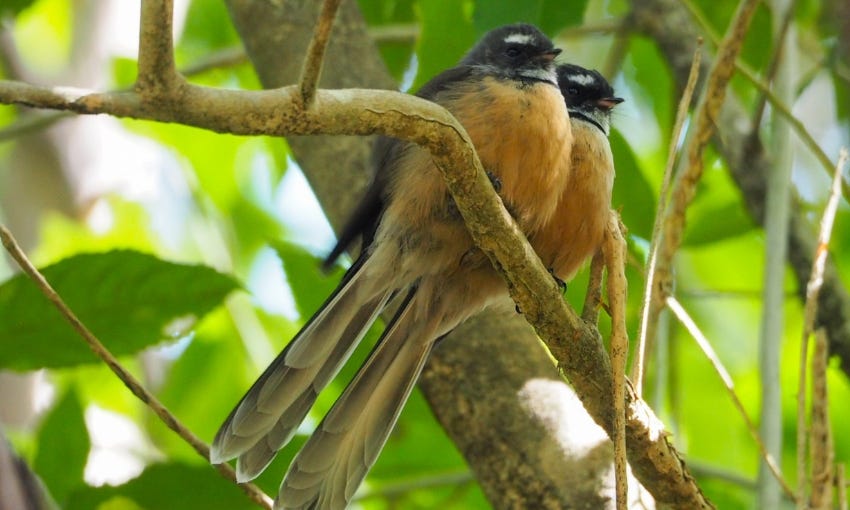New Zealand Olympians speak out on heatwave risks
‘We sometimes have to play in conditions where an egg can literally be fried on the court.’
Kia ora! Welcome to Future Proof. Thanks for joining me. This week: Denmark announces a tax on cow burps. But first: NZ Olympians discuss how climate-fuelled heatwaves affect sports performance.
Medvedev at the Tokyo Olympics. Image credit: Anadolu Agency via Getty Images.
During the Tokyo Olympics in 2021, top tennis player Daniil Medvedev asked match officials if the International Tennis Federation would take responsibility if he died on the court.
It was the third round of the men’s singles, and the temperature was peaking at 31 °C – although with the oppressive humidity, it felt like 38 °C.
Later that day, Spanish player Paula Badosa left the court in a wheelchair after suffering heatstroke.
Marcus Daniell remembers that the Tokyo heat felt like “true risk” – the type that could “potentially be fatal”. Daniell, a New Zealand doubles player, won bronze at those Olympics. “It was impossible to hydrate well enough to combat the heat and humidity,” he recalls, noting that heatstroke is common in tennis.
“For me it’s like you are in the build-up to the worst part of a bad flu – shivery and weird and hot and cold,” he describes. “Your mind can’t focus and your mouth is disgustingly dry. And the dangerous thing is that athletes often don’t know when to stop, because we’re conditioned to push ourselves beyond limits as a rule.
“We sometimes have to play in conditions where an egg can literally be fried on the court. This is not fun or healthy… I don’t believe there should have to be a series of heat-related deaths for us to put reasonable limitations in place.”
Daniell’s warnings are part of a new report about extreme heat at the Olympics, Rings of Fire. While Tokyo was considered the “hottest Olympics ever”, the upcoming Paris games could push the mercury to new heights. Since the Olympics were last held in Paris in 1924, the average temperature in the city has risen by 3.1 °C. And with heat-related deaths sweeping across the northern hemisphere, the risk of a fatally hot Olympics feels closer than ever.
Pole vaulter and Olympic bronze medallist Eliza McCartney says that when the heat and humidity rise, the sweat makes her pole slippery and potentially unsafe.
And hockey player Hugo Inglis believes his Tokyo Olympic dream was cut short due to “crazy heat protocols” that included full body ice baths, leading to a hamstring tear before the second match.
Inglis recalls playing in 40°C heat in Malaysia and nearly blacking out in the changing room: “I felt terrible. Physically sick, head pounding, body going limp, some shivers. The room goes dark and vision is hard to focus,” he says. Inglis adds that high heat and humidity mean hockey players change up their tactics too, resulting in “a diluted spectacle for fans and broadcasters alike”.
But it’s those broadcasters that have dictated that the Olympics should be held during the hottest months of the year. While in the 1960s, games in Tokyo and in Mexico City were held in October, such later scheduling clashes with American football, baseball, and the early European football season.
With the extreme heat supercharged by climate change, Kiwi footballer Katie Rood is left wondering whether the climate cost of high-performance sport is worth it. “It’s a terrifying prospect when we see the direction things are heading and how rapidly the climate is deteriorating around us,” she says. “I think using sport as a vehicle for positive change is a key element to a habitable future.”
The Rings of Fire report makes five key recommendations, drawing on feedback from athletes. They include smarter scheduling to avoid the hottest part of the day, supporting athletes to speak out, and reassessing fossil fuel sponsorship. “The main cause of climate change is clear: emissions from fossil fuels,” the report reads. “Sport needs to reexamine its relationship with fossil fuel companies.”
Join The Spinoff Members
“The Spinoff is one of the great pleasures of my reading life, the repository of timely and quality journalism that continues to surprise, delight and inform.” – Denise, Spinoff Member since 2020.
If, like Denise, you enjoy our work and want to support us, please consider becoming a member today. Already a member? Ka nui te mihi, your support means the world to us.
Denmark set to introduce tax on livestock burps by 2030
Last week, the Danish centre-right government unveiled its plans to introduce a tax on agricultural emissions from 2030. This makes the Nordic nation potentially the first to implement a price on livestock burps, after New Zealand’s government axed similar plans (although the coalition government still contends it will introduce a scheme by 2030). Like New Zealand, Denmark is a major dairy exporter and agriculture is its major source of planet-heating emissions. Experts predict the tax plan will slash Denmark’s emissions by 1.8 million tonnes in its first year, helping to achieve the nation’s 2030 goal of 70% reduction in emissions relative to 1990 levels.
Under the Danish plan, proceeds from the tax will be invested back into the industry’s green transition for two years, and 600,000 acres of land will be reforested. The bill is expected to be signed into law after the summer break, with wide support for the plan from many (but not all) farmers, industry and unions.
The Danish government has also released a strategy for encouraging its citizens to eat more plant-based foods – a challenge for a people who famously love their pork and butter.
Lids, so confusing
I’m relieved I’m not the only one struggling to come to terms with the new recycling rules: the waste sector is still reporting high levels of contamination in our yellow bins, Shanti Mathias reports. You cannot recycle lids of any kind – unless you’re recycling a tin can and the lid is still attached. And pizza boxes, with crumbs removed, are A-OK, even if they’re a lil greasy. For recycling inspo, I’ve always loved Taiwan’s system, where the rubbish truck blasts a jingle Mr Whippy-style, calling citizens to sort their waste directly into the truck.
‘Land back’ is synonymous with climate action
“Rebuilding and strengthening papakāinga is peak climate adaptation. It means that hapū will be able to continue to do in the future what they have always done so well in the past: take care of people,” writes Nadine Hura, in an essay reflecting on how ahi kaa are “fully paid up adaptation warriors” with expertise honed through surviving colonialism. The essay accompanies a new season of the Ko Papa Ko Rangi podcast, in which Hura and co-host Ruia Aperahama discuss four adaptation research projects led by marae, hapū or iwi.
More stories
The New Zealand government has just appointed a panel to review the methane component of our climate targets – an approach labelled “problematic” by a top climate scientist, RNZ’s Eloise Gibson reports.
Is it possible to be a beef-loving environmentalist?
Part of celebrating Matariki is looking to the environment for tohu (signs) for the new year. So Rangitāne, an iwi local to Dannevirke, held a climate change wānanga.
Amazon rainforest peoples have released a detailed plan to save their home, centred on ending fossil fuel subsidies and securing Indigenous land rights.
Happy Plastic Free July! Eco-entrepreneur Brianne West talks to the founder of the Plastic Free July movement on her podcast.
We could strip 4% of our emissions if we stopped wasting food, reports the Herald’s Jamie Morton, as the outgoing prime minister’s chief science advisor, Juliet Gerrard, releases a report offering recommendations to get us there.
The annual snowline survey, monitoring the Southern Alps glaciers from their air since 1977, reveals startling ice loss.
Pīwakawaka/NZ fantails. Image credit: Ellen Rykers.
To finish this edition, the New Zealand Garden Bird Survey kicked off again a few days ago and runs until the end of this weekend. You can help researchers chart the rise of the pīwakawaka and quack the case of possible declines by taking part. As I wrote this time last year, counting birds is a simple act anyone can find joy in.
Have a fan-tastic week,
Ellen
Future Proof is looking for a sponsor!
Connect your brand with an insightful exploration of environmental news, reaching influential readers committed to sustainability and staying informed about the state of our natural world. Contact commercial@thespinoff.co.nz to learn more.
Got some feedback about Future Proof or topics you’d like covered? Get in touch with me at futureproof@thespinoff.co.nz












